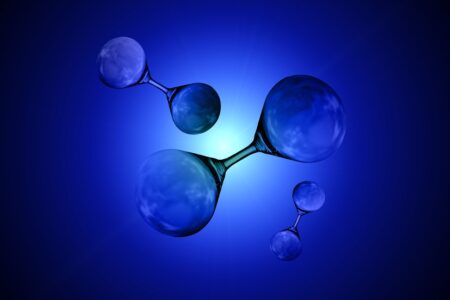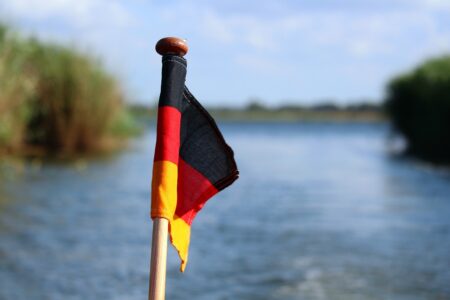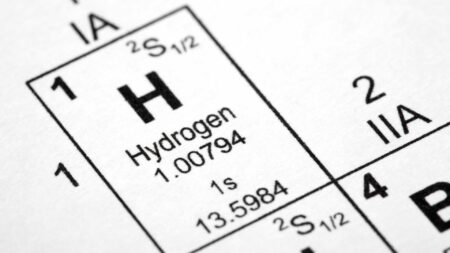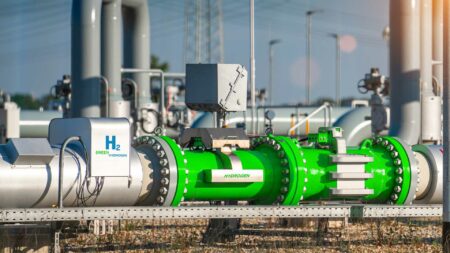€26 million for hydrogen research at the University of Jena
The University of Jena will receive over 26 million euros for research on light-based green hydrogen and complex biosystems. According to Friedrich Schiller University, the money will be used to fund two of the university’s specific research areas for further four years by the German Research Foundation (DFG).
The “CataLight” initiative, which focuses on research and ecologically friendly solar fuel manufacturing, has received funding. Chemical techniques should be used to turn sunlight into “green” hydrogen. The goal is to create solar energy converters that do not use environmentally hazardous, scarce elements like ruthenium, platinum, or rhodium.
22 distinct studies in the “ChemBioSys” initiative are also investigating the intricate communication pathways and interrelationships between various species and their surroundings. The focus is on so-called natural chemicals, which are thought to be nature’s “chemical language,” according to academics.
Germany and the United States have decided to work together more closely on energy and environmental issues.
A statement on a new climate and energy collaboration was signed by representatives from both parties. According to Federal Economics and Climate Protection Minister Robert Habeck, such collaborations, which Germany has with many other nations, are an essential tool for improving climate protection in tangible terms (Greens).
Wind, hydrogen, zero-emissions transportation, and developing-country collaboration
In four areas, German-American expert working groups will collaborate on a permanent basis:
- the growth of the offshore wind energy industry,
- Hydrogen,
- Transportation that emits no greenhouse gases
- Partnerships with developing and rising nations
John Kerry, the United States’ climate commissioner, commended Germany as a worldwide leader in the energy transition. “Long before it was fashionable or even profitable,” Kerry added, “it was a country that moved ahead and accepted the risk of considerable investment in renewable energy.” Both governments hoped that their collaboration will inspire other countries to take advantage of the energy transition’s potential.
The deal is based on a partnership established last summer by then-Chancellor Angela Merkel (CDU) and US Vice President Joe Biden. The declaration was signed on the margins of the G7 meeting of Environment, Climate Protection, and Energy Ministers in Berlin on Friday. Germany is the current head of the group, which also includes France, Italy, Japan, Canada, the United States, and the United Kingdom.
Germany to speed up green hydrogen development in Australia
Germany’s research minister said on Friday that the nation wants to speed up its green hydrogen collaboration with Australia since the country’s drive to move away from fossil fuels has become more essential as a result of Russia’s invasion of Ukraine.
The Ukraine conflict, which Moscow refers to as a “special operation,” has exposed Germany’s and the European Union’s reliance on Russian fossil resources, making energy security a serious concern for many countries across the world.
“The demand to become independent from fossil fuels has become more obvious and urgent these days, due to Russia’s awful campaign of aggression against Ukraine,” Minister for Education and Research Bettina Stark-Watzinger said in an interview.
As part of Berlin’s attempts to produce ecologically friendly hydrogen, Germany and Australia struck a contract last year to construct a renewable energy-based supply chain between the two nations.
Because Germany’s need for green hydrogen cannot be supplied locally, it is looking for international collaborations to ensure imports.
According to Stark-Watzinger, the objective is to attain commercial-scale production of green hydrogen by 2030, if not sooner, primarily to supply Germany’s steel sector.
“I think it could be sooner than that once we get started and the process gets momentum,” said Stark-Watzinger, who is on a four-day trip across Australia to meet with researchers and companies, including Woodside Energy Group Ltd and Fortescue Metals Group, two of Australia’s largest commodities exporters.
Germany is looking to secure Woodside and Fortescue as green hydrogen suppliers, while the two corporations are eager in collaborating with German companies to obtain electrolyzers, she added.
In March, Germany’s E.ON and Fortescue’s green power division inked a memorandum of understanding to investigate delivering green hydrogen to Europe.
Green hydrogen is created by splitting water using electrolyzers fueled by renewable energy.
The next phase is for German and Australian firms to apply for funding for demonstration projects that include green hydrogen generation, transportation, and use by June.
Australia and Germany said last year that they will invest roughly $90 million in hydrogen demonstration projects.
The departing conservative government of Australia set aside A$1.2 billion for funding for hydrogen-related initiatives. Hydrogen production is one area of an energy strategy that has received support from both political parties in the country.
Germany, which established a hydrogen strategy in 2020, is focusing on green hydrogen rather than blue hydrogen, which is made from natural gas and captures the carbon dioxide generated during the process.
“With the present natural gas crisis and price increase, blue hydrogen is now out of the question for Germany,” Stark-Watzinger added.
BMDV: Implementation for the hydrogen innovation and technology center can begin
The Federal Ministry of Transport currently intends to establish the Hydrogen Innovation and Technology Center (ITZ).
This has been validated by the feasibility study. The BMDV is planning to provide up to EUR 290 million in start-up funding for the four locations, and the federal states intend to provide extra support to the centers. In the future, the ITZ will assist enterprises in their transportation-related development efforts.
This includes, in particular, testing and certification services that are not yet offered on the market. The center’s services should also promote worldwide standards-setting collaboration and provide a development environment, particularly for small and medium-sized businesses.
The ITZ will be established at four locations: Chemnitz, Duisburg, Pfeffenhausen, and a north German cluster (Bremen/Bremerhaven, Hamburg, and Stade), with Chemnitz overseeing railway applications.
Solaris and Wrightbus will provide up to one hundred hydrogen-powered fuel cell hybrid buses to the city of Cologne and its operator, Regionalverkehr Köln GmbH (RVK).

«We’re making significant advances toward our objective of ‘zero emissions,’ thanks to funding from the Federal Ministry of Digital Affairs and Transport and a quick bidding procedure.’ We are looking forward to receiving the Solaris buses and learning from Wrightbus as a new manufacturer—this is critical for the conversion of our fleet», stated RVK CEO Dr. Marcel Frank.
The contract has been awarded to Solaris and Wrightbus.
Solaris Bus & Coach competed in the tender and was granted the contract for a total of 20 fuel cell hybrid buses, 20 guaranteed and 20 optional. The first 20 solo buses will be delivered later this year and gradually incorporated into RVK’s fleet, according to existing plans.
Under the tender, Wrightbus was awarded a contract for 20 assured and 40 optional hydrogen buses. The 20 hydrogen buses, which will be tailored to German circumstances, will be delivered by the end of 2023. RVK plans to test the first hydrogen-powered articulated buses in the fourth quarter of 2022, which are presently unavailable on the market.
The Federal Ministry of Digital Affairs and Transportation will fund the buses in accordance with the BMDV’s bus and rail financing rules. NOW GmbH coordinates the funding guideline, which is carried out by Project Management Jülich.








